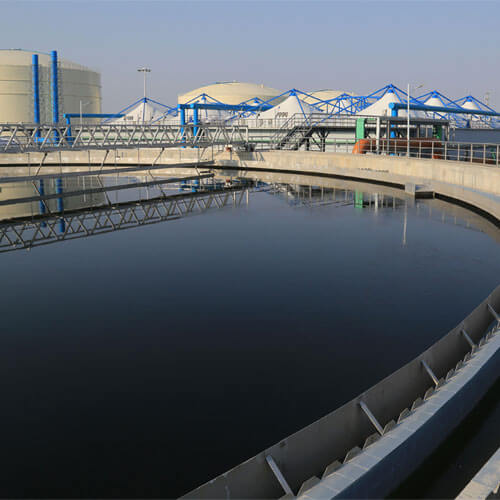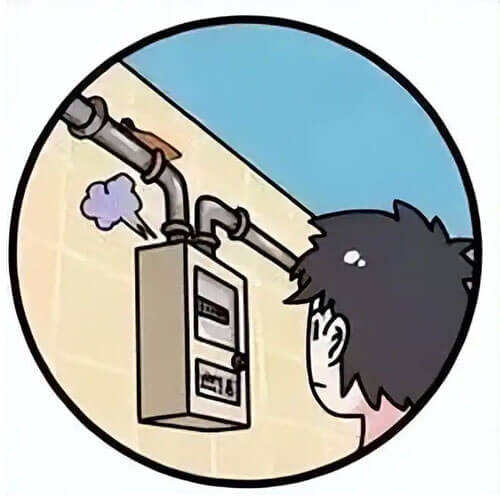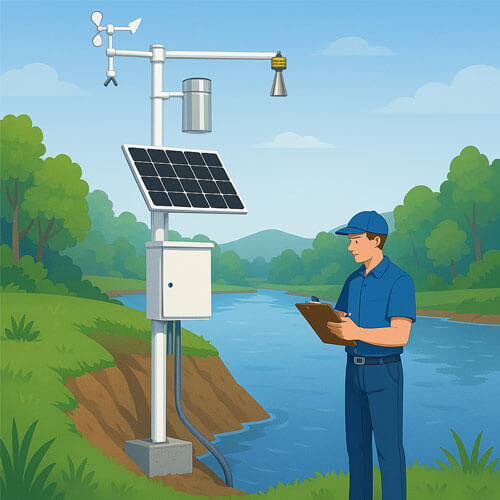Since the dawn of industrial development, the emission of various toxic gases and solid waste has continuously polluted our air, soil, and water sources. This has made it essential to utilize advanced technologies such as sensors and the Internet of Things (IoT) to establish scientific environmental monitoring systems, enabling us to monitor and mitigate the environmental damage caused by industrial activities.
What is Environmental Monitoring?
Environmental monitoring involves using sensors and IoT technologies to track changes in various indicators that affect environmental quality. The collected data is analyzed to develop environmental protection strategies. It is primarily utilized by environmental monitoring stations, environmental protection agencies, and third-party testing companies. The scope of environmental monitoring typically includes areas such as air quality, water quality, soil, noise, and biodiversity.
Types of Environmental Monitoring
Based on the different monitoring targets, environmental monitoring can be divided into air environmental monitoring, soil environmental monitoring, water environmental monitoring, noise environmental monitoring, and biodiversity environmental monitoring.
Air Monitoring
Air is one of the primary targets of environmental monitoring because air quality has a significant impact on human health. The main focus of air monitoring is air pollutants, which can exist in gaseous forms, such as sulfur dioxide and nitrogen oxides, or as particulate matter, such as PM2.5 and PM10. The concentration of these pollutants helps evaluate air quality and their potential effects on human health.
Soil Monitoring
Soil environmental monitoring utilizes advanced instruments and technologies to conduct long-term or periodic assessments of soil conditions. The aim is to evaluate soil quality and understand the distribution and changes of pollutants. Soil monitoring is generally divided into two main categories: monitoring the content of various nutrients in the soil and tracking changes in soil pollutants.
Water Quality Monitoring
Approximately 70% of the Earth’s surface is covered by water, and both production and daily life are heavily dependent on it. Thus, water quality is another key focus of environmental monitoring. By monitoring changes in trace elements and pollutants in water, the state of water quality can be analyzed. Typical water quality monitoring parameters include water temperature, pH, dissolved oxygen, transparency, nutrients (such as nitrogen and phosphorus), heavy metal content, microbial content, and species composition.
Noise Monitoring
With the rapid development of industries such as manufacturing and transportation, noise pollution has become an increasingly serious issue. Noise pollution can disrupt sleep, damage hearing, and have negative effects on both plants and animals. By conducting noise monitoring, we can assess the extent of noise impacts on the ecological environment and provide strong support for ecological protection efforts.
Biodiversity Monitoring
Biodiversity monitoring is a vital part of environmental monitoring. It involves the dynamic observation of species diversity, population sizes, and distribution ranges to assess the health of ecosystems and track environmental changes. Biodiversity monitoring is carried out through traditional ground-based manual observations and advanced technologies for automatic data collection.
Five Types of Environmental Monitoring Systems
From the content above, we have learned about the different types of environmental monitoring. Depending on the specific targets of monitoring, the composition of environmental monitoring systems varies. Below, I will introduce the main components of different environmental monitoring systems.
Air Environmental Monitoring System
An air monitoring system is a scientific system designed to collect, transmit, and analyze data on various pollutants in the atmosphere. It includes various sensors, data collection and transmission devices, data management platforms, and other components. Below are the main components of an air monitoring system:
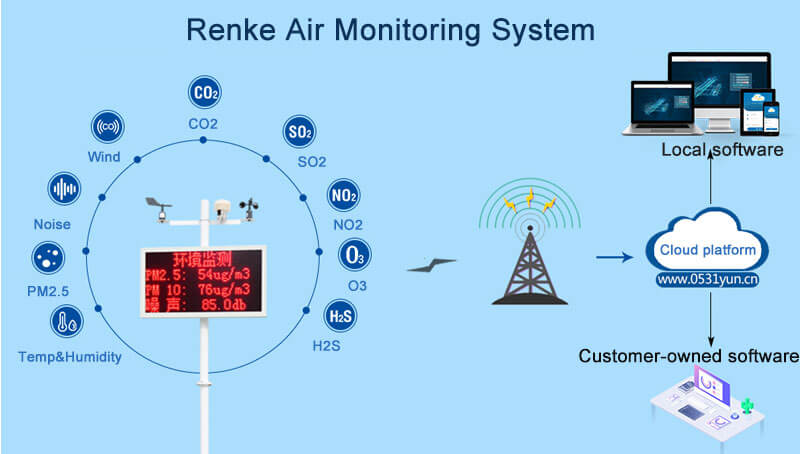
1. Gas and weather sensors
The measurement end of the air monitoring system consists of various gas sensors and weather sensors. These sensors measure different air parameters through physical or chemical reactions. For example, air quality sensors that measure PM2.5 concentration using light scattering, CO2 sensors using NDIR infrared technology, and the SO2 sensor, NO2 sensor, ozone sensor using electrochemical principles. In addition to monitoring these major air pollutants, wetather sensors are deployed to record data such as wind speed, wind direction, temperature, humidity, and atmospheric pressure, enabling the scientific analysis of pollutant dispersion and transmission.
2. Host and IoT
Sensors only have measurement capabilities. To upload data, a monitoring host is also required. The monitoring host collects and stores data from various sensors, performs denoising and normalization to ensure data accuracy, then uploads the data to the data center via the Internet of Things. Typically, a monitoring host connects to multiple measurement units. For example, our monitoring host can simultaneously collect data from 32 RS485 sensors.
3. Data platform
The management system serves as a data analysis and processing platform, including cloud platforms, local software, or other customer-owned platforms. Through the data platform, managers can view real-time data, historical data, set alarm thresholds, control valve switches, check the operational status of equipment, and perform remote calibration and maintenance.
Soil Environmental Monitoring System
A soil monitoring system typically consists of four main components: sensors, data collectors, communication modules, and cloud platforms. Below are the key components:
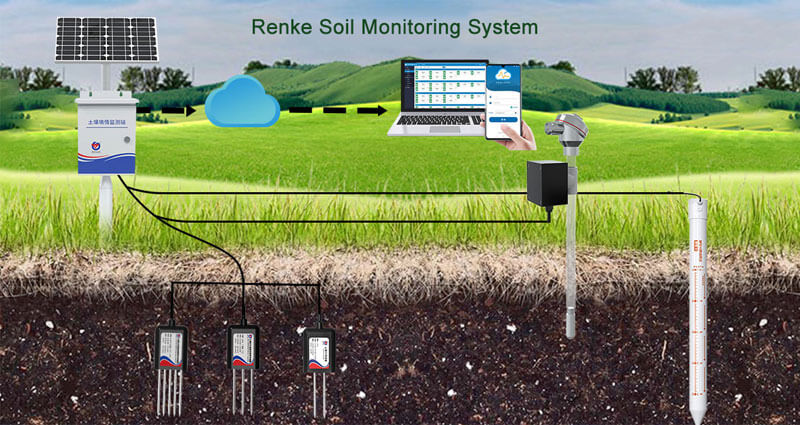
Various soil sensors are deployed to monitor parameters such as soil moisture, temperature, electrical conductivity (EC), pH, salinity, organic matter content, nitrogen, phosphorus, potassium, and heavy metal concentrations. These sensors accurately measure the physical and chemical properties of the soil, providing foundational data for soil health assessment.
2. Data collector
The data collector is responsible for gathering real-time data from the sensors and converting it into digital signals. Data collectors typically have multi-channel data acquisition capabilities, allowing them to process data from multiple sensors simultaneously.
3. Communication module
After the data is converted into digital signals by the data collector, it is uploaded in real-time to the management platform via the communication module. Modern soil monitoring systems can use wired or wireless communication technologies such as RS485, LoRa, NB-IoT, 4G, etc., ensuring timely and stable data transmission.
4. Cloud platform or local software
The cloud platform or local software acts as the data processing center, responsible for receiving, storing, and analyzing the data. These management platforms typically feature advanced data organization and analysis functions, enabling users to view soil health conditions in real-time and generate decision support reports.
Water Environmental Monitoring System
Water quality monitoring is a complex and sophisticated system, typically consisting of key components such as water quality sensors, data collector, Internet of Things (IoT) technologies, data processing centers, and early warning systems.
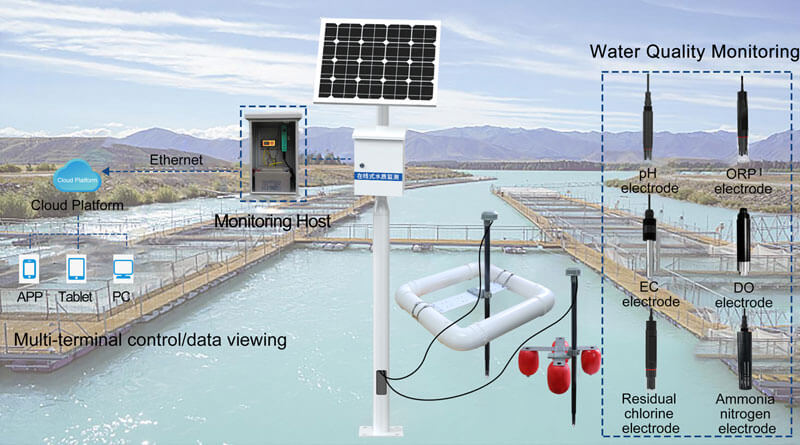
Various water quality sensors act as the “eyes” of the system, allowing real-time measurement of various water quality parameters such as temperature, pH, dissolved oxygen, turbidity, COD, conductivity, residual chlorine, calcium ions, and ammonia nitrogen. These parameters are crucial indicators of water quality and provide a comprehensive reflection of the health of water.
2. Data collector
The data collector is responsible for collecting data from various water quality sensors in real time, organizing, storing, and converting it. After the data is converted into digital signals by the host, it is uploaded to the management platform via the Internet of Things (IoT). A single host can simultaneously collect and store data from 32 RS485 water quality sensors.
3. Internet of Things (IoT) technology
IoT technology enables remote and automated data transmission. Water quality data collected by sensors is sent in real time to the cloud platform or data center via wireless networks such as LoRa, Wi-Fi, 4G, or satellite communication. This allows managers to access and analyze water quality data anytime and anywhere.
4. Data management platform
The management platform analyzes, stores, and archives the collected data. Using big data analysis and processing technologies, the system can monitor water quality in real time, identify trends in water quality changes, and detect potential issues. When abnormal water quality is detected, the platform automatically sends out alerts. This helps managers take timely action to prevent further deterioration of water quality.
5. Data analysis and reporting tools
Using advanced data analysis techniques, the system generates detailed water quality reports that provide decision support for managers. These reports not only include real-time water quality data but also comparisons with historical data, trend forecasts, and other relevant information.
Noise Environmental Monitoring System
The noise monitoring system is a comprehensive environmental monitoring device that integrates sound collection, data processing, remote transmission, and intelligent analysis. Its purpose is to monitor and assess environmental noise conditions in real time.
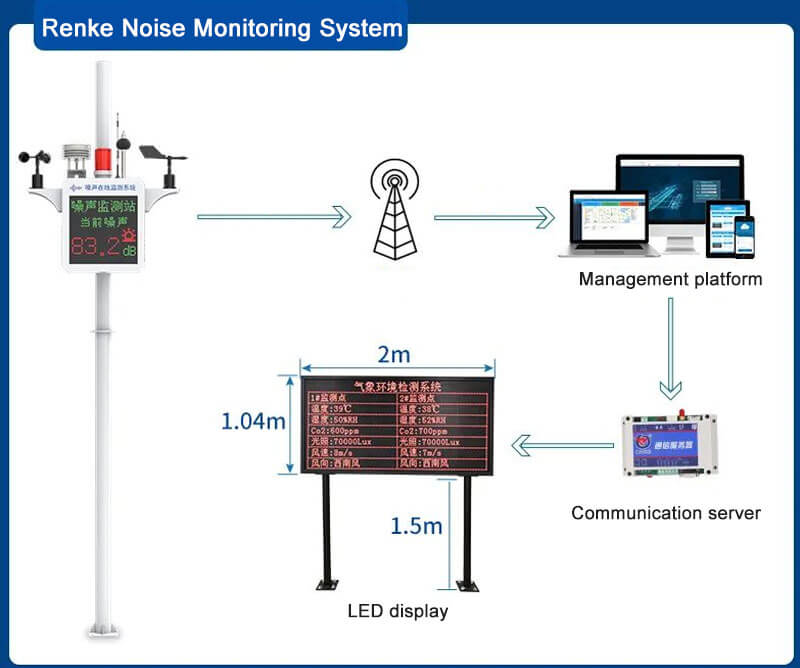
1. Noise sensors or detectors
The noise sensor is the front-end of the system, responsible for capturing sound signals in the environment in real time. These noise detectors have high sensitivity, enabling them to accurately capture sound information and convert it into electrical signals for subsequent analysis. The selection and placement of noise detectors are critical to ensure the accuracy and representativeness of the data.
2. Transmission module
The transmission module is responsible for transmitting the collected noise data from the monitoring end to the data management center. This step typically uses wireless transmission technologies such as Wi-Fi, ZigBee, etc., to ensure the real-time nature and accuracy of the data.
3. Data analysis platform
The data analysis platform is the core of the noise monitoring system. This unit receives data from the transmission module, performing operations such as feature extraction and pattern recognition. Through specialized algorithms and software, the system can monitor noise levels in real time, identify abnormal noise, and predict noise trends, providing decision support for managers.
Biodiversity Monitoring System
The biodiversity monitoring system tracks, records, and analyzes changes in biodiversity within a specific area. By collecting and storing relevant data, it helps scientists or environmental protection agencies understand the health of ecosystems and develop corresponding conservation measures.
1. Collection equipment
Biodiversity collection equipment typically includes remote sensing satellites, drones, automatic camera traps, acoustic monitors, and species detection tools (such as DNA barcoding technology). These devices are used to gather environmental and biological data, such as species counts, habitat conditions, genetic diversity, and environmental parameters.
2. Database
The database stores and manages biodiversity monitoring data. This data can include species numbers, habitat conditions, genetic diversity, and environmental metrics.
3. Analysis tools
Technologies like statistical analysis, Geographic Information Systems (GIS), Artificial Intelligence (AI), and machine learning are used to process and analyze the collected data, uncovering dynamic changes and potential trends in biodiversity.
4. Reporting tools
Reporting tools generate biodiversity reports and provide intuitive visualization tools to help decision-makers devise conservation measures, evaluate management effectiveness, and plan future monitoring efforts.
Conclusion
Environmental monitoring is a complex technical task that requires the targeted and reasonable construction of corresponding monitoring systems. As a professional brand in environmental monitoring equipment manufacturing, Renke has extensive experience in monitoring water quality, soil, climate, noise, and pollution. We can provide you with advanced equipment and the best monitoring solutions.




